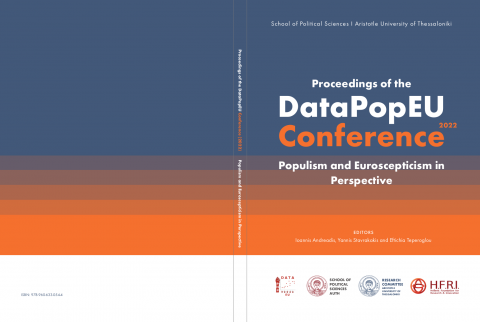DataPopEU project
The aim of the project
DataPopEU is a research project that aims to develop novel methods and techniques to collect, process (clean) and analyze internet and big volume data to systematically investigate the significant political patterns of populism and euroscepticism in the Greek context.
DataPopEU Newsletter
Submitted by andreadis on Mon, 02/20/2023 - 21:19*English version below*
Με την ολοκλήρωση των εργασιών του ερευνητικού έργου DataPopEU θέλουμε να σας ευχαριστήσουμε για άλλη μία φορά που μας τιμήσατε με την παρουσία σας στο Διεθνές Συνέδριο που πραγματοποιήθηκε στις 7-8 Δεκεμβρίου 2022 στο χώρο του ΚΕΔΕΑ ΑΠΘ και για την εγγραφή σας στο DataPopEU Newsletter.
Σας προσκαλούμε να δοκιμάσετε την εφαρμογή «Πυξίδα Λαϊκισμού και Ευρωσκεπτικισμού», την οποία μπορείτε να βρείτε στον ακόλουθο σύνδεσμο:
Πυξίδα Λαϊκισμού και Ευρωσκεπτικισμού και Διεθνές Συνέδριο 7-8 Δεκεμβρίου 2022
Submitted by andreadis on Mon, 12/05/2022 - 10:03Η Πυξίδα Λαϊκισμού και Ευρωσκεπτικισμού: https://popeu.helpmevote.gr είναι μία ηλεκτρονική εφαρμογή που επιτρέπει στους πολίτες να συγκρίνουν τις θέσεις τους με τις θέσεις των κομμάτων σε θέματα λαϊκισμού, ευρωσκεπτικισμού και ατομικών ελευθεριών. Ο μηχανισμός της εφαρμογής είναι απλός: οι θέσεις των κομμάτων (ο βαθμός συμφωνίας τους με διάφορες θέσεις) κωδικοποιούνται από μια ομάδα ακαδημαϊκών ερευνητών. Έπειτα οι πολίτες καλούνται να συμπληρώσουν το ίδιο ερωτηματολόγιο και να εκφράσουν τις προσωπικές απόψεις τους.
Αναρτήθηκε στην υποδομή Clarin El το corpus του προγράμματος DataPopEU
Submitted by andreadis on Thu, 07/21/2022 - 18:19Αναρτήθηκε στο αποθετήριο της Εθνικής Υποδομή Γλωσσικών Πόρων & Τεχνολογιών Clarin EL για τα γλωσσικά δεδομένα & εργαλεία γλωσσικής επεξεργασίας το Ηλεκτρονικό Σώμα Κειμένων (corpus) που δημιουργήθηκε στο πλαίσιο του χρηματοδοτούμενου από το ΕΛΙΔΕΚ προγράμματος DataPopEU “Καινοτόμες μέθοδοι και δεδομένα υψηλής ποιότητας για την έρευνα του λαϊκισμού και του Ευρω-σκεπτικισμού”.
New presentations available at DataPOPEU
Submitted by andreadis on Thu, 10/28/2021 - 18:20Dear DataPOPEU subscribers,
In the news section of our website, we have uploaded new presentations that you can watch. One of the new presentations is on Recruiting participants for a probability-based web survey sample via text messages (SMS) presented by DataPopEU's PI Ioannis Andreadis at WAPOR’s 74th Annual Conference, November 2-6, 2021.
Research Activities
Book Chapters
Populism through surveys: Personality, attitudes and behaviour. In Research Handbook on Populism (pp. 336–346). Edward Elgar Publishing.
Throughout an extensive conceptual and theoretical literature, populism is most often examined under the auspices of a supply-side phenomenon. Besides the overly long debates about the definition of populism, most of the extant populism scholarship has focused on the rhetoric of populist movements, parties and leaders. Recent scholarship has shifted its focus on using survey items to measure populist attitudes. This shift has enabled scholars to study populism both on the supply and the demand sides of politics. The chapter sets out to provide a general overview of this scholarship, identifying three primary axes of research. First, recent research efforts examine how populism relates to individuals’ traits or personalities. Second, a novel research pathway studies the so-called populist citizen, meaning those citizens who are more prone to hold populist attitudes. Third, a broader field of research subsequently analyses those individuals who actively support or vote for populist parties or leaders.
More info at: Rehus, P., Tsigkou, M., Hauwaert, S. M. V., & Andreadis, I. (2024). Populism through surveys: Personality, attitudes and behaviour. In Research Handbook on Populism (pp. 336–346). Edward Elgar Publishing.
Impact
Scientific impact
The proposed theoretical and methodological innovations and the data cleaning tools we will create, can be applied widely in the social sciences and humanities.
This project will:
• contribute to the community of web survey practitioners, providing evidence and knowledge on maximized response rate and response quality by investigating best practices to maximize data quality via different web experiments with respect to splitting a long questionnaire into shorter parts, exploring the optimal survey length and the optimal duration of the breaks between the sub-questionnaires, and applying data cleaning methods relying on response quality indicators.
• demonstrate that social media data can either supplement or even substitute some web survey data by cross-validating social media data (Facebook and Twitter) with web-survey data (Hellenic Candidate Study, Hellenic Voter Study, Expert Survey). This innovative supersession of more “traditional” data sources (web surveys) with big data (produced by social media posts) could help to reduce the length of web survey questionnaires: since we will be able to collect some of the information from their social media posts, we will not have to ask them to provide the same information on the questionnaire.
• promote the combined use of social media data, online questionnaire data and printed data to build knowledge about the attitudes and opinions of social and political actors on major issues like populism and euroscepticism.
News
H Πυξίδα Λαϊκισμού και Ευρωσκεπτικισμού του DataPopEU στο TV100
https://www.youtube.com/watch?v=3xqQJ9stRs0
Παρουσίαση του DataPopEU στο FM100
https://anchor.fm/ioannis-a-andreadis/episodes/DataPopEU--FM100-e1sotp2/...

